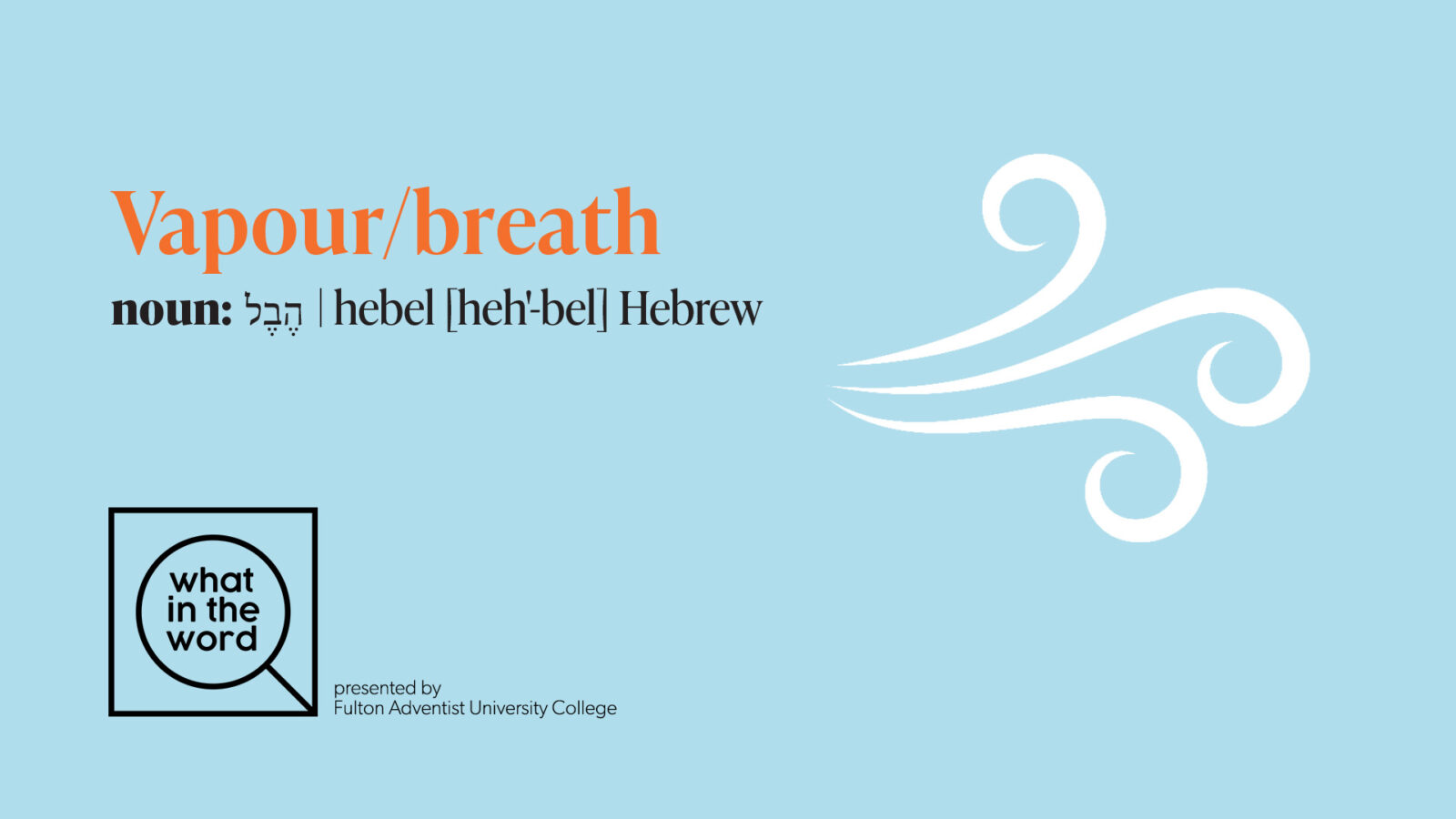The Hebrew term hebel occurs 73 times in the Old Testament. It is translated variously into English as vapour, breath, futility, nothingness, meaningless and vanity. Hebel may seem subtle, but most authors use it to convey our insignificance in the grand scheme of things. We live a short and futile life.
The Hebrew root idea for hebel is introduced in Genesis. Eve conceived Cain and said, “I have acquired a man from the Lord” (Genesis 4:1).1 “Then she bore again, this time his brother Abel [הֶבֶל Hebel]. Now Abel [Hebel] was a keeper of sheep, but Cain was a tiller of the ground” (Genesis 4:2, hebel is used here twice). Hebel appears again in Genesis 4:4 (twice), Genesis 4:8 (twice), Genesis 4:9 (once) and Genesis 4:25 (once). The story ended tragically when the life of Abel (hebel) was cut short by his elder brother Cain. Like vapour, Abel’s life symbolises brevity. He was a mere breath in the annals of history.
The word hebel can also refer to anything fleeting, ephemeral or fragile. Job 7:16 says, “I loathe my life; I would not live forever. Let me alone, ‘for my days are but a breath’” [hebel]. Living forever may seem like a wonderful prospect for healthy and happy individuals. However, Job did not enjoy life. He was ill and miserable. He lived only one “breath” at a time. Psalm 39:5, “Certainly every man at his best state is but vapour” [hebel]. Psalm 94:11, “The Lord knows the thoughts of man, that they are futile” [hebel]. Psalm 144:4, “Man is like a breath [hebel]; His days are like a passing shadow.”2 The Hebrew verb habal is emphatic: “they followed idols [vanity] and became idolaters [vain]” (2 Kings 17:15; cf. Job 27:12; Psalm 62:11; Jeremiah 2:5; 23:16). Especially when chasing after “worthless” (Jonah 2:8; 2 Kings 7:15; Jeremiah 2:5) or “vain idols” (Psalm 31:47) of the heathens (see Isaiah 40:18-20 and 44:9-20). When we replace God with an idol, there is nothing solid to grasp, only vapour.
The time we spend on earth is like a blink. We are relatively insignificant in the whole scheme of things. This theme is explored best in Ecclesiastes. “The preacher” [Hebrew title, Qoheleth] (1:1 KJV) or “the teacher” (NIV) emphasises the absurdity of life. Solomon is Qoheleth, but Divine Wisdom also speaks through him. “Vanity of vanities [Hebel hebelim],” says the Preacher, “Vanity of vanities!” All is vanity [Hebel hebelim hakkol hebel]” (1:2). Solomon speaks to the people metaphorically. He expounds his biographical quest for meaning, “What does man gain from all his labour at which he toils under the sun?” (1:3). He discovered that “pleasure” (2:1), “industry” (labour) and “human wisdom” was “toilsome” and “meaningless” (hebel), like “chasing after the wind” (2:11, 15, 22, 23; 4:4). Even all of “life”, “leaving an inheritance” (2:18, 21), “acquiring riches” (4:7, 8), “political popularity” (4:16), “many dreams” (5:7), “wealth” (6:2), “foolish laughter” (7:6) and “injustice” (8:14) are all fleeting. His summation: “Let us hear the conclusion of the whole matter: Fear God and keep His commandments, for this is the whole duty of man” (12:13).
Life is like breath (hebel). It is short. Everything we desire or value more than God is an “idol” that is useless and futile. The recurring 35 references to the word hebel in 29 verses in Ecclesiastes, is intentional. It’s to remind us, emphatically, that life without God and an afterlife is ultimately meaningless. Authentic and genuine meaning can only be found when we invite God into our daily lives. In Emmanuel, God is with us. And when we are with God, our eternity is secured.
Dr Limoni Manu O’Uiha is senior lecturer of theology at Fulton Adventist University College, Sabeto, Fiji.
1. All Bible citations used in this article are taken from the NKJV, unless otherwise indicated.
2. Cf. Job 9:29, 21:34, Psalm 39:7; Lamentations 4:17; Isaiah 30:7; and Jeremiah 10:3, 8.






